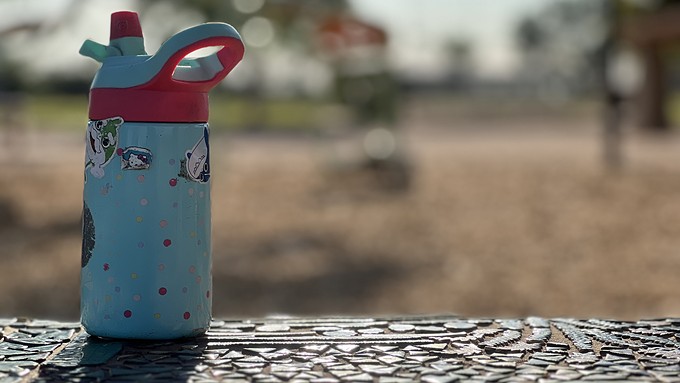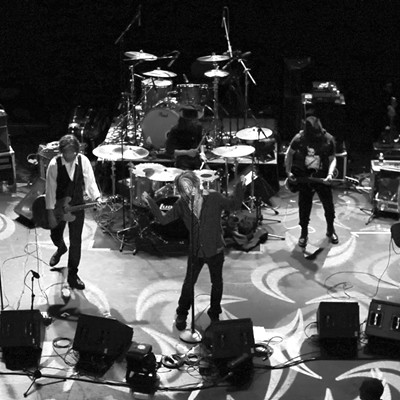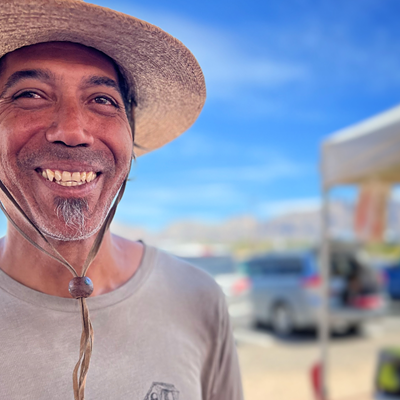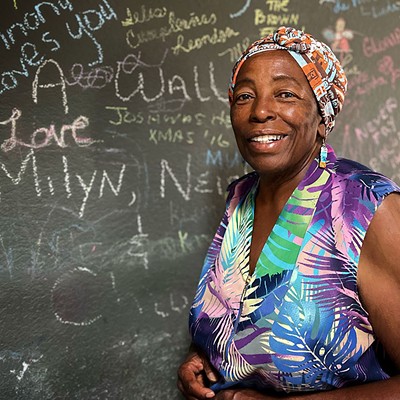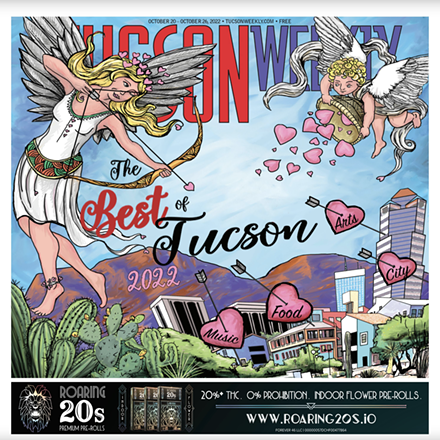When Isaiah was about 5 years old, no one believed him. He is tall for his age, and now he’d just turned 9, but looks 13. He wields a peculiar little-boy charisma. He is spindly, in black athletic shorts, shoes (big for his age), and his is an easygoing, shy manner, accented with a kickass medium spiky Afro. He is propelled on kid enthusiasm, wonder and sincerity, a combination that, I imagine, if he keeps it close, could take him far in life. He’s all here, man. I’ve never seen this kid before at the playground in Tucson’s Fort Lowell Park where I come often with my family.
Isiah carries a basketball. He really likes the sport he says. He travels the playground on his own. It is fairly hot out on this June weekday afternoon, no breeze, which is strange; it is gusty in Tucson these days, blows more than I remember as a child growing up here, and I think of climate change and pressure gradients as I watch my daughter play. What else do these children inherit?
My 3-year-old daughter Rickie takes an instant liking to Isaiah. He is kind.
His interactions with Rickie build into the jumps, gymnastics moves on the monkey bars, Rickie laughs hard, keen to imitate everything Isaiah does, his movements and gyrations. She attempts the efforts, and he is patient with her struggles, offers help with gentle hands, his smile recurrent and indulgent as a preschool teacher.
I imagine this kid sharing a bedroom with a younger brother or sister, maybe some sports figures tacked up around his bed, an oversized stuffed penguin in the corner, some light-up Fortnite figures on a dresser.
Rickie removes her socks and shoes to climb up one of the slides and Isaiah follows suit. It takes Rickie 30 seconds to slide and climb to the top and Isaiah does it in one leap, and jumps down from the top, a good seven feet to the woodchip-covered surface of the playground, and rolls. Rickie howls.
I ask him if his parents are around.
“We’re staying here a couple days,” Isaiah manages, pulling a playground woodchip from his hair.
“Staying the park?” I say.
“We’ve been staying around, we don’t really have a home.”
Isaiah points in the general direction of the historic park’s lake, an otherwise lovely respite with the remembrance benches of long-gone park devotees, turtles, flora, grass on all sides pockmarked by a million ground-squirrel holes and an outlying pecan grove and reed-encased duck pond and flowing water features. Ramadas and tennis courts supplant ruins and refurbishments detailing the late-1800s Army post, and the ugly Apache Wars, the disarticulation of the Apaches from their ancestral homeland.
He doesn’t give me any kind of needy or solicitous look, as if for him this is what it is.
It is easy to misread his carriage, to twist any meanings, as it is equally difficult to place myself in his or his mother’s shoes.
From what I gather young Isaiah’s mother is single, and under such circumstances appears to be doing something right, the boy is sharp and observant.
Isaiah tells me his dad lives in Chicago, in an apartment, and his mother is trying to get child support out of him so they can have a place to live.
I do not see the mother anywhere. I cannot ask her such questions and I don’t understand his situation but a gist rises from our hanging out at the park. I would not indulge uneasy questions to a boy but I do imagine a mother somewhere in the recesses of the park, in the forest of creosote, or in a car, nursing degrees of grief. I cannot ask her if she traversed available routes; the homeless services, street outreaches, family shelters, safe-haven homes, hospitality houses, vouchers.
In Tucson, the latest stats (January 2023) by the Pima Collaboration to End Homelessness counted nearly 100 homeless families in Tucson. (The data informs local and national homelessness resource planning.) How many housing-insecure families are on the verge, into an impoverished, often soulless and brutal Tucson summer, is but a guess. Isaiah just wants to play.
Isaiah disappears, crosses a baseball field, around the swimming pool, still alive with sun-burning kids at 5 p.m., and returns a half-hour later or so. He smiles at Rickie and she is excited to see him. But we have to leave.
Rickie and I walk to my car hand-in-hand, and my daughter asks, “Where is Isaiah going?” I look back and see Isaiah alone on the playground, clutching his basketball. In that moment he looks around, lets out a visual shrug and tosses the ball in the air and catches it. To Rickie, I say, “He is waiting for his mama.”
She adds, “Where’s his mama?”
I lift her up into my arms and squeeze. Just watching my children grow and change affords so much ache, the endless and tender instant nostalgias, but to throw in any idea of being unhoused, which I’ve been in the past, sends such thoughts swirling.
How potent my sadness is, a swelling with no place to go, and how time-honored that sensation is — the despondency and pity asphyxiating in my gut, resigned and barbed.
As the sun wanes, I wrestle Rickie into her car seat and climb in behind the wheel, fire up the motor and pull out into the brassy setting sun. There is nothing in this moment I can do to help Isaiah. I observe Rickie in the rearview, think of what my father would likely say to me as a boy, that Isaiah has a mother and he is an American, and therefore he will always have a good chance, regardless of his family ethnicity. My dad’s father lost everything in the Great Depression, and there was a time when I was young that my dad, a highly intelligent skeptical optimist, and lifelong Democrat, actually believed in this idea, or at least told us he did. By the time he died, I know he did not believe such things. To me, I grew up thinking my dad understood a world in which society and cruelty were linked like a daisy chain.
Before we left, Isaiah told me he’d be here at the park tomorrow. The following day we return, and I bring some cash. No Isaiah.
Rickie steps on to the playground and asks, “Where’s Isaiah? At the ducks?”
We return the next day too, same result. Isaiah is gone. Maybe, at least, like my optimist father believed when I was a boy, somewhere with four walls and a roof.

